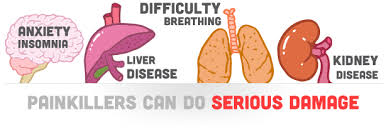
Painkiller killed Prince?
The shocking news came a few weeks ago when Prince, Prince, lost his life from an accidental painkiller overdose, the official autopsy has confirmed. This powerful painkiller, Fentanyl, is known to cause serious side effects.
This accident has raised questions about the use of dangerous opioid painkillers.
Fentanyl can cause breathing difficulties and death. Deaths caused by the use of painkillers is on the rise.
One problem with regularly taking painkillers is that we develop tolerance towards the drug and as a result you will need more and more drugs to kill the pain even just temporarily. Where a cocktail of drugs is used, the drug interactions are too complex even for the experts to be sure of. Will you put your health at risk? Why not address your pain more holistically?
For more details about news regarding Prince, check out ABC NewsRadio link: http://www.abc.net.au/newsradio/content/s4475385.htm
More People Died from Painkillers than Car Accidents?
In the U.S., there are more people who died from taking painkillers than car accidents. That’s outrageous. I grew up in Hong Kong where the culture regards drugs as something not to be taken lightly. It’s the absolute last resort. My parents never took painkillers in their lives and taught us to steer clear of them because of the side effects. So I never knew people who took painkillers until I moved to Australia at 17. I was shocked how quickly people went for painkillers and cortisone injection and even sleeping pills. Many doctors recommend them to patients as part of a routine treatment.
Why are painkillers taken like cough lollies in this country? Most people know that painkillers don’t actually solve problems and yet have no second thoughts about taking them. I don’t mean the extreme pain that can cause more problems than the drug side effects. Most of the time we take painkillers to make the pain go away temporarily and hope that our problem will disappear by itself. Well, some of the times the body does heal itself. But more often than not, the pain will come back as soon as you come off the drug if nothing is being done about the actual problem. We need to do something about what the pain is trying to tell us.
Pain can be Your Friend
Most of the time pain is telling you to correct a problem and protect you from hurting yourself more.
Take an extreme example of the absence of pain. Some unfortunate people are not able to feel pain. As a result of this disorder, they bump and burn themselves without knowing it. This causes infection, ulceration and serious problems. They wish they could just be able to feel the pain so they can protect their bodies from being hurt.
I saw my GP for a diagnosis of hip pain years ago. She said there was nothing she could do apart from suggesting painkillers. I said I wanted to be able to feel the pain so I would not move it in a wrong way and make the problem worse. So thanks, but no thanks.
Listen to the Pain, Look after your Body
When you have a headache, do you take a pill and soldier on? Or do you find out what actually causes the pain in the first place? There are so many different causes of a headache. It seems like a strange idea to use one pill – painkiller – for everything.
A headache can mean so many things:
Stress
Food sensitivities
Cold/flu
Sleep deprivation
Premenstrual tension
Dehydration
Eyestrain
Hangover
Neck and shoulder tension
Head injuries
High blood pressure
Brain tumour
Your headache might just be telling you to get some sleep, drink water, relax, stay warm and have a good posture. And if it still doesn’t go away, you probably need to seek help from a therapist who can help you find out the root cause of the problem.
What You May Not Know About Painkillers
The list of side effects of any drug concerns me.
Here are just some serious side effects of the common painkillers that you want to watch out for, according to www.drugs.com.
Paracetamol
This is one of the most commonly used and suggested drugs for pain.
Overuse may cause kidney and liver problems.
Here is the list of some of the serious side effects:
Bloody stools & urine
Fever
Lower back pain
Pinpoint spots on skin
Skin rash, hives, or itching
Sore throat
Sores, ulcers, white spots on the lips or mouth
Sudden decrease in the amount of urine
Unusual bleeding or bruising
Unusual tired or weakness
Yellow eyes or skin
Diarrhoea
Increased sweating
Loss of appetite
Nausea or vomiting
Stomach cramps
Nurofen
This is a nonsteroidal anti-inflammatory drug (NSAID) that reduces the hormones (prostaglandins) that cause inflammation and pain in the body. But by reducing these protective hormones of the lining of the stomach, the overuse of this drug can cause internal bleeding.
Here is a list of some of the side effects.
Abdominal pain
Acid stomach
Belching
Bloating
Cloudy urine
Decrease in the amount of urine
Diarrhoea
Difficult bowel movement
Indegestion
Itching skin
Passing gas
Pale skin
Nausea or vomiting
Unusual bleeding or bruising
Unusual tiredness or weakness
There are still many more side effects. The bottom line is – please research before you take any drug.
Acupuncture and Chinese medicine may be able to alleviate some of the symptoms of these conditions:
Allergic rhinitis (e.g. hay fever)
Ankle pain
Abdominal pain
Back pain
Bladder irritability
Finger joint pain
Golf elbow
Headaches
Heel pain
Hip bursitis
Knee pain
Migraines
Menstrual pain
Muscle pain
Neck pain
Phantom limb pain
Sciatica
Shoulder pain
Sinusitis pain
Tennis elbow
Stay informed. Stay healthy.


